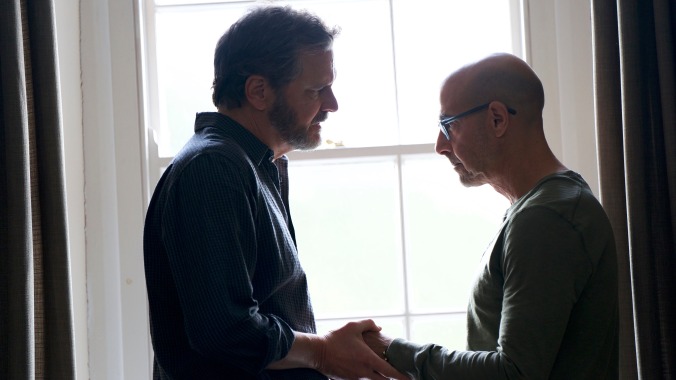But as we watch Tusker’s control slowly slip through his grasp, we realize that we’re watching a man mourn what he once was, a bright star collapsing too soon. “I’m becoming a passenger,” Tusker helplessly observes at a particularly pivotal moment of the story. “And I’m not a passenger.” By the end, Supernova isn’t necessarily a tale about a couple’s attempt to make the best of their last moments but about two people coming to grips with one’s mortality. Macqueen approaches the messy reality of letting go with measured sorrow, unrestrained tenderness, and even moments of joy.
When Sam, an accomplished classical pianist, is asked to perform a special recital across Britain’s Lake District, he and Tusker take the opportunity to turn their trek into a leisurely sojourn, complete with an overdue visit with family and close friends. This isn’t just any other trip; it’s what they presume to be their last adventure before dementia completely claims Tusker’s memory and faculties. The vicious disease is already seeping into the relationship in subtle ways. For Tusker, it manifests in his inability to read a loving speech that he wrote himself, button his own shirt, or even remember the names of basic shapes when he’s teaching his partner about the constellations. Sam, for his part, is forced to watch the once-exuberant love of his life not only slip away but somehow come to terms with his own inevitable decline—something Sam himself isn’t able to face just yet.
Though their journey is not without its warm moments—stargazing in old campgrounds, playful bickering in a roadside diner sparked by Tusker’s dark sense of humor—there’s an abiding sense of melancholy that permeates the film. Visually, the earthy color palette and warm lighting are striking but never too vibrant, casting a shadow over the proceedings. Legendary cinematographer Dick Pope highlights the beauty of the countryside without stealing focus from the engaging couple at the film’s center. There are far more scenes that take place at night than during the day, often showing Sam and Tusker taking respite in their various beds throughout the trip. It’s a welcome touch for a drama about a couple at its most vulnerable.
As Sam, Firth packs a tremendous amount of heartbreak into each despondent glance toward Tusker. It’s especially potent during moments of serious introspection, as he questions whether or not he can serve as an effective caregiver for his ill partner. These provide about all the insight that the audience gets on Sam as a person—we don’t learn too much about who he is outside of his relationship. It’s one of the weaker elements of Macqueen’s script, considering how much we see of Tusker beyond his partnership, disease, and occupation. But Firth still manages to render a great deal of anguish from the somewhat limited personal material he’s given.
Sam, who is naturally more subdued, makes for a fitting counterpart to Tusker, whose acerbic wit and extroverted spirit keep Supernova from becoming too claustrophobic with despair. Tucci’s magnetism makes him ideal for the role of a man personable to a fault and known to command a room. The only thing that can contend with Firth’s softly wounded expression is Tucci’s devastatingly resigned countenance, befitting someone simultaneously accepting and lamenting his fate while still attempting to exude positivity for those around him. At one point, Sam’s sister, Lilly (Pippa Haywood), limply suggests an article about an experimental drug rumored to have a positive effect on patients with dementia. Tucci’s pained smile while he politely agrees to read the article despite knowing that his prognosis is a lost cause is as heart-wrenching as any overtly tearjerking moment.
Supernova doesn’t offer as many bangs as one might expect from a film with its title. Until a third-act turning point, it progresses at a deliberate pace, low on action and tension. The film is intimate, but it drags a little, too—even at a modest 93 minutes. But when the unexpected climax finally arrives, Tucci and Firth blaze with the intensity you’d expect from a couple in love who want extremely different things. Whether sweetly cuddling in bed or fighting for their happily-ever-after in a rented cottage, these acting heavyweights never lose sight of the adoration that fuels their characters. They make a formidable team—one perfectly equipped to carry this story on their lonesome.










































